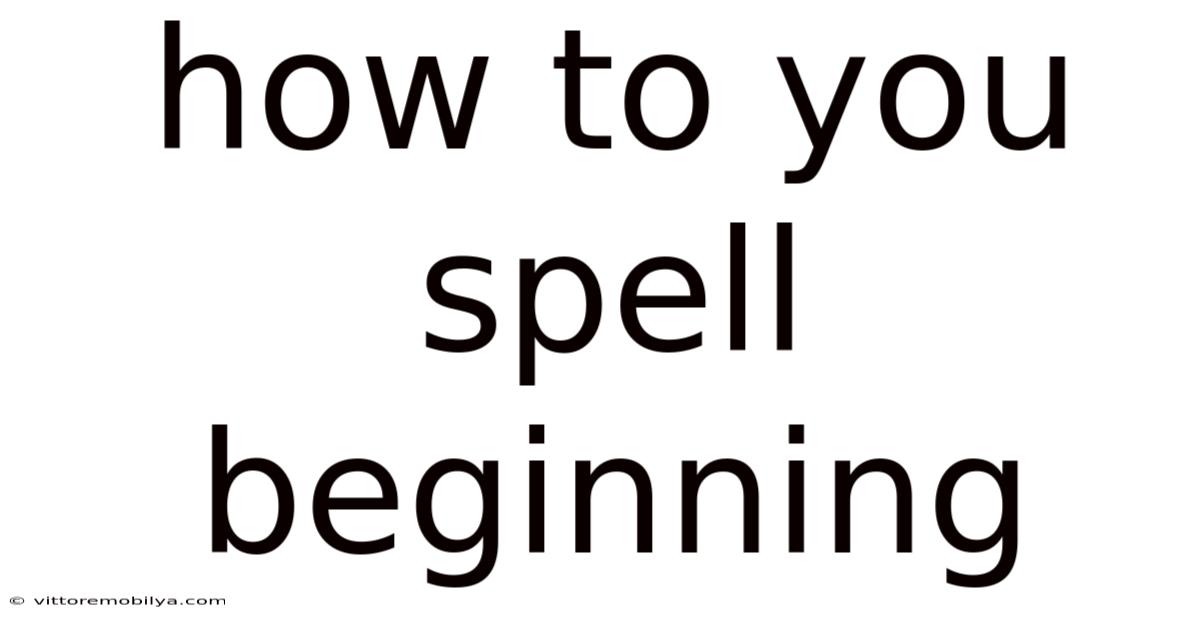How To You Spell Beginning
vittoremobilya
Sep 17, 2025 · 4 min read

Table of Contents
How Do You Spell "Beginning"? Mastering Spelling and Understanding Word Origins
The seemingly simple question, "How do you spell 'beginning'?" opens a door to a fascinating exploration of English orthography, etymology, and the evolution of language. While the answer itself is straightforward – beginning – the journey to understanding its spelling reveals much about the complexities and historical influences shaping the English language. This comprehensive guide delves into the spelling of "beginning," explores its origins, and offers practical tips for improving your spelling skills.
Understanding the Spelling of "Beginning"
The spelling of "beginning" reflects its Germanic roots and the historical evolution of the English language. It's a relatively straightforward word once you break it down:
-
Begin: This is the root word, carrying the core meaning of starting or commencing. Its spelling is consistent with its Old English origins.
-
-ning: This suffix is a common English suffix indicating a state, action, or process. Think of other words with this suffix: running, singing, drawing. The "-ning" suffix in "beginning" signifies the act or process of starting.
Therefore, the spelling "beginning" is a logical combination of its constituent parts, each retaining historical significance.
Etymological Journey: Tracing the Roots of "Beginning"
To fully grasp the spelling of "beginning," we need to embark on a short etymological journey. The word "beginning" traces its ancestry back to Old English:
- Beginnan: This is the Old English ancestor of "begin." It comprised the elements be- (meaning "by" or "around"), ginnan (meaning "to yawn, to gape," implying the opening or commencement of something), and the infinitive marker -an.
The evolution from beginnan to "begin" reflects the natural shifts in pronunciation and spelling that occur over centuries. The suffix "-ning" also has Old English roots, deriving from the suffix -ung, signifying an action or process. Therefore, the spelling of "beginning" is a testament to the enduring influence of Old English on modern English vocabulary.
Spelling Rules and Patterns: Applying Them to "Beginning"
While "beginning" may seem like an exception, it actually follows several established spelling rules and patterns in English:
-
Root Word Consistency: The root word "begin" maintains consistency throughout its various forms (begins, began, begun). This consistency simplifies the spelling of related words like "beginning."
-
Suffix Application: The suffix "-ning" is consistently added to many verbs to create nouns describing the action or process. Understanding this pattern helps spell similar words correctly.
-
Phonetic Awareness: While English spelling isn't always perfectly phonetic, understanding the sounds represented by letters and letter combinations can improve spelling accuracy. In "beginning," each letter or letter combination contributes to a discernible sound.
Common Spelling Mistakes and How to Avoid Them
While "beginning" is generally spelled correctly by native speakers, there are potential points of confusion for learners of English:
-
Double 'n': Remembering the double 'n' in "-ning" is crucial. Many similar suffixes only use a single 'n,' so this point requires specific attention.
-
'i' before 'e' except after 'c': Although the word doesn't follow this classic rule, it's a reminder of the intricacies of English spelling, emphasizing the need for memorization of frequently used words.
-
Confusion with Similar Words: Words like "beginning," "beginning," "beginner," and "begun" might be confusing for those learning the language. Focusing on the distinct meanings of each word and their variations can help improve accuracy.
Practical Tips for Improving Spelling Skills
Mastering spelling, particularly for irregular words like "beginning," requires consistent effort and the right approach:
-
Visual Memory: Repeatedly writing the word "beginning" reinforces visual memory, which is crucial for spelling accuracy.
-
Contextual Learning: Using "beginning" in sentences and paragraphs helps cement its spelling within the context of language usage.
-
Mnemonic Devices: Create a memorable association or mnemonic device to recall the spelling of "beginning." For example, remember that there are two "n's" in the suffix.
-
Dictionary and Thesaurus Use: Regularly consulting a dictionary or thesaurus helps confirm spellings and expands vocabulary.
Frequently Asked Questions (FAQs)
Q: Is there a shorter way to write "beginning"?
A: No, "beginning" is already the shortest and most common way to spell this word. There are no accepted abbreviations or contractions.
Q: What are some synonyms for "beginning"?
A: Many words can substitute for "beginning" depending on the context: start, commencement, outset, inception, initiation, opening, onset.
Q: How is "beginning" pronounced?
A: The pronunciation is /bɪˈɡɪnɪŋ/, with the emphasis on the first syllable.
Q: Are there any other words with the "-ning" suffix that share similar spelling challenges?
A: Many words with the "-ning" suffix can present challenges, depending on the root word. Examples include winning, running, planning, and shining. Understanding the patterns and the need for the double 'n' is key to spelling these words correctly.
Conclusion: Mastering the Art of Spelling
While spelling "beginning" may appear simple at first glance, a deeper understanding of its etymological roots and spelling patterns reveals a fascinating aspect of the English language. By combining consistent practice, mnemonic devices, and a focus on contextual understanding, you can improve your spelling skills and confidently use words like "beginning" in your writing. Remember that mastering spelling is a journey, not a destination, and consistent effort will yield rewarding results. Embrace the complexity of the English language and enjoy the process of learning and refinement.
Latest Posts
Latest Posts
-
Santoku Knife Vs Chef Knife
Sep 17, 2025
-
Food Examples Of Chemical Changes
Sep 17, 2025
-
Top Chinese Restaurants Near Me
Sep 17, 2025
-
Cost To Install Ceiling Fan
Sep 17, 2025
-
Managed Vs Unmanaged Ethernet Switch
Sep 17, 2025
Related Post
Thank you for visiting our website which covers about How To You Spell Beginning . We hope the information provided has been useful to you. Feel free to contact us if you have any questions or need further assistance. See you next time and don't miss to bookmark.